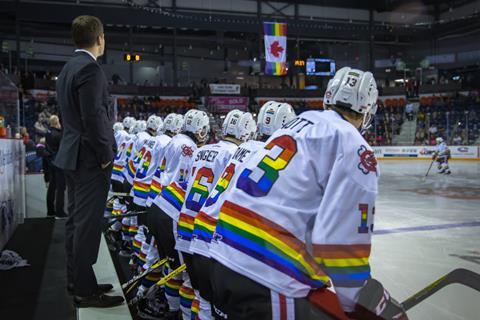Tensions are running high in hockey as Canadian players refuse to wear Pride-themed jerseys. But Michael Coren wonders if they've misunderstood what Pride symbolises

If you dare to call it ice-hockey in Canada they’ll deport you!
It’s hockey, the national obsession, and also a passion in northern USA, Russia, and much of Scandinavia. The National Hockey League (NHL) is the North American equivalent of the Premiership, with teams from Las Vegas to Montreal, and Los Angeles to Winnipeg. The players are household names and the league is big entertainment and big business.
So, when various teams decide to celebrate Pride it’s important. Not that they do it to the same extent as English football, and the acceptance of the LGBT community in sporting culture this side of the Atlantic is limited compared to Britain.
Here in Canada, various hockey teams have decided to wear Pride-themes shirts in their pre-game warmups. But last week the San Jose Sharks goalie, Canadian James Reimer, announced that he wouldn’t take part in his team warmup because of their Pride-themes jerseys. It was, he said, contrary to his Christian beliefs.
In a statement, Reimer said: "For all 13 years of my NHL career, I have been a Christian - not just in title, but in how I choose to live my life daily...I have no hate in my heart for anyone, and I have always strived to treat everyone that I encounter with respect and kindness. In this specific instance, I am choosing not to endorse something that is counter to my personal convictions which are based on the Bible, the highest authority in my life."
Back in January Ivan Provorov of the Philadelphia Flyers made a similar decision, the Russian player explaining that he had to "stay true to myself and my religion.” The New York Rangers team also said they wouldn’t wear Pride shirts after previously announcing that they would.
Two brothers, Canadians Eric and Marc Staal, both of whom play for the Florida Panthers, have also refused to wear Pride-themed jerseys in warmups. They issued a statement very much like that of James Reimer. They said that didn’t judge how, “people choose to live their lives, and believe that all people should be welcome in all aspects of the game of hockey…having said that, we feel that by us wearing a Pride jersey it goes against our Christian beliefs.”
All of these men have, of course, been championed by some as heroes of their faith, and heavily criticised by others as being homophobic and bigoted. But they’ve not been fined or penalised, and in the world of multi-millionaire hockey stars they’re hardly martyrs. Sides have been taken, and once again very little room has been left for discussion and Christian disagreement.
What does Pride mean?
Where, I believe, these sportsmen have gone wrong is in their understanding of Pride and the selective nature of their stands.
Pride has become increasingly mainstream and even establishment. For most people, Pride is simply about general inclusion - the idea that people of all sexual orientations should be welcome in our society - and this is something these hockey players claim to support. Surely we can all support the idea that discriminating against someone on the basis of their sexual orientation is wrong, and counter to the way of Jesus?
But perhaps that's not the issue. Maybe these players see Pride as being specifically about endorisng the rightness of same-sex relationships? If so, they surely need to be more specific and explicit about it. When the Staal brothers state that, “We carry no judgement on how people choose to live their lives” are they being candid? Would it not be more honest to say, "We think same sex relationships are contrary to God's will for us"?
Taking a stand
Then there’s the choice of which particular causes to make a stand on.
Hockey is renowned for its violence, with so-called “enforcers” whose job is partly to fight other players. Hockey can be a beautiful and elegant sport but the North American version of it has given brawling an iconic status. This is replicated by young people, and infects hockey culture in general. A Christian stance against that would be welcome, but would likely have extremely negative consequences for a professional player.
Another deeply worrying issue involves the advertisers behind the game, not always promoting the best in human nature and a number of them now promoting gambling. With countless gambling addicts across North America, campaigners have urged players to speak out. Nothing yet.
The Gospel way
These men are athletes rather than politicians or theologians, and it would be unfair to expect too much. But as one critic said to me, “Imagine a kid in small-town Canada who is already terrified of coming out. He looks to his heroes not to celebrate his sexuality but make him feel wanted and loved. This is yet another slap in the face.”
It shouldn’t be about triumph or defeat, shouting and screaming, but about listening and reflecting. That’s the Christian way, the Gospel way.
Wearing a shirt for a few minutes before a game isn’t a great deal to ask. Does it really make one a better Christian to refuse?





































